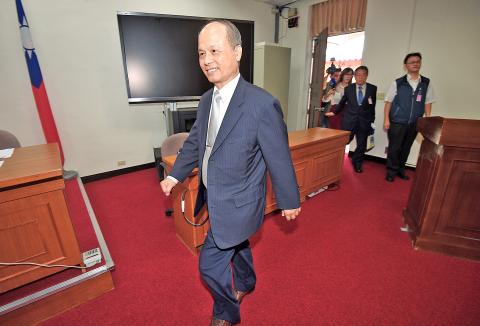Minister of Finance Chang Sheng-ford (張盛和) yesterday said he would respect a legislative decision to amend the stock transaction and capital gains taxes, as the rapid global slowdown warrants economically friendly policies.
The legislature today is expected to approve proposals to cut the stock transaction tax from 0.3 percent to 0.25 percent and set the capital gains tax at 0.05 percent.
The planned change, the fourth of its kind in three years, would leave tax burdens intact for most investors, but would spare active traders a 0.1 percent levy on share transactions totaling NT$1 billion (US$30.62 million) within a year.

Photo: Lo Pei-der, Taipei Times
“The proposed revision has turned from taxation into a political issue,” Chang told reporters.
Chinese Nationalist Party (KMT) presidential candidate Hung Hsiu-chu (洪秀柱) proposed the revision to woo stock investors, Chang said.
The move might also help to settle the longstanding controversy over changes to the taxes and end the policy uncertainty once and for all, Chang added.
The unexpected and rapid economic slowdown lent support to policies favorable to GDP growth, he said, adding that the taxation change could be considered a stimulus measure.
The nation’s export-oriented economy grew 3.84 percent in the first quarter, but slowed to 0.52 percent in the second quarter and is struggling to stay above zero this quarter due to faltering external demand.
The decline in exports showed signs of easing this month after reaching double-digit percentages the past three months, Chang said, adding that the landscape might improve next quarter due to Christmas sales.
To prop up the economy, the ministry is considering commodity tax cuts on new-car purchases and encouraging exports of used cars, Chang said.
While exports of used cars might not lift GDP growth much, it would help boost domestic demand and ease air pollution, as old cars tend to be less environmentally friendly, he said.
The ministry plans to cut the commodity tax for new car purchases by NT$30,000 to NT$50,000, but it is up to the Cabinet to finalize the details, the minister said.
Used cars are badly needed in emerging countries and generate significant revenue for exporters in South Korea and Japan, Chang said.
Used cars carry heavy weight in the local market as well, with two-year-old cars accounting for 50 percent of overall automobiles, the minister said.
The commodity tax cut would provide rental agencies incentives to buy new cars, he said.

US PROBE: The Information reported that the US Department of Commerce is investigating whether the firm made advanced chips for China’s Huawei Taiwan Semiconductor Manufacturing Co (TSMC, 台積電), the world’s largest contract maker of advanced chips, yesterday said it is a law-abiding company, and is committed to complying with all applicable laws and regulations including export controls. The Hsinchu-based chip giant issued the statement after US news Web site The Information ran a story saying that the US Department of Commerce has launched a probe into TSMC over whether it breached export rules by making smartphone or artificial intelligence (AI) chips for China’s Huawei Technologies Co (華為). “We maintain a robust and comprehensive export system for monitoring and ensuring compliance,” the statement said. “If we

DEMAND FOR AI CHIPS: Net income in the third quarter surged 31.2% quarter-on-quarter to NT$325.26 billion, the strongest quarterly return in the company’s history Taiwan Semiconductor Manufacturing Co (TSMC, 台積電), the world’s biggest contract chipmaker, yesterday raised its revenue forecast to annual growth of 30 percent this year, thanks to strong and sustainable demand for artificial intelligence (AI) processors for servers. It was the second upward adjustment from 25 percent year-on-year growth estimated three months ago, despite recent concerns about whether the AI boom could be another technology bubble. “The demand is real. It’s real. And I believe it is just the beginning of this demand. Alright, so one of my key customers said the demand right now is ‘insane,’” TSMC chairman and chief executive C.C.

Starbucks Corp might have the more recognizable name, but 7-Eleven’s City Cafe remains the king of Taiwan’s fresh coffee market, helped by the convenience store chain’s extensive market presence and product diversification. President Chain Store Corp (PCSC, 統一超商), which runs both the 7-Eleven and Starbucks store chains in Taiwan, established the City Cafe brand in 2004. The brand took off when actress Gwei Lun-mei (桂綸鎂) became its spokesperson in 2007. City Cafe’s sales exceeded NT$10 billion (US$311.69 million) for the first time in 2015, surpassing the revenue of Starbucks Taiwan, and rose to more than NT$17 billion last year, exceeding the NT$14.98

COUNTRY-BASED: Setting ceilings on sales of the technology would tighten limits that originally targeted China’s ambitions in artificial intelligence amid security risks US officials have discussed capping sales of advanced artificial intelligence (AI) chips from Nvidia Corp and other American companies on a country-specific basis, people familiar with the matter said, a move that would limit some nations’ AI capabilities. The new approach would set a ceiling on export licenses for some countries in the interest of national security, according to the people, who described the private discussions on condition of anonymity. Officials in the administration of US President Joe Biden focused on Persian Gulf countries that have a growing appetite for AI data centers and the deep pockets to fund them, the people